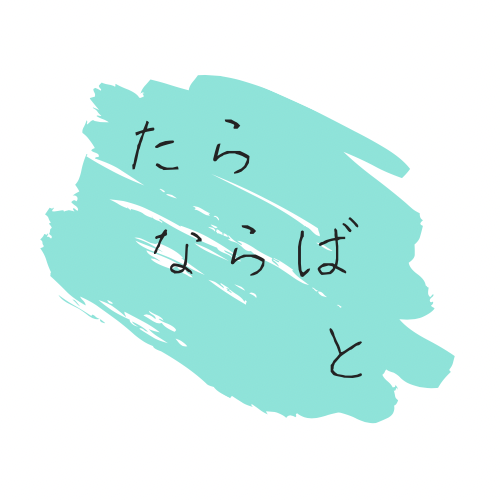The differences between たら, ならば and と
たら
1. コーヒーを飲んだら、出かけます。
ta-form of verbs with ら=when/after
When I’m done with drinking coffee, I’ll go out.
This usage is generally used when people want to say that people take different actions or different things happen when something is done. This is also used only with verbs.
例
本を読んだら、返します。 When I read a book, I’ll return it.
布団に入ったら、すぐに寝てしまいました。
When I got in bed, I unintentionally fell asleep quickly.
気づいたら、もう駅に着いていました。
When I realized, I have already arrived at the station.
2. (もし)日本語がペラペラになったら、
何をしたいですか?
If your Japanese becomes fluent, what do you want to do?
I-adjectives without い+かったら
Na-adjectives without な +だったら
ta-form of verbs+ら
= if
This usage is used when people want to say if something unrealistic or possible happens. もし is sometimes used with this expression and always comes to the beginning.
例
(もし)日本に行ったら、何をしますか?
If you go to Japan, what will you do?
(もし)100万円あったら、私は新しいゲームを買います。
If I have 1 million yen, I would buy a new video game.
(もし)調子が良かったら、明日学校に行きます。
If my condition is good, I’ll go to school tomorrow.
(もし)私の日本語が完璧だったら、日本人ともっと話したいです。
If my Japanese is perfect, I would like to speak with Japanese people more.
3. 彼だったら、さっき会いましたよ。
If I mention about him, I saw him a second ago.
Nだったら=if I mention about…/speaking of…/if a person does…
例
A:ペン、 どこかにいっちゃった。 My pen is gone.
B:(Aが探している)ペンだったら、机の上で見たよ。
If I mention about your pen, I saw it on the table.
A:おいしいコーヒーの店、知ってる? You know a good coffee shop?
B:コーヒーだったら、友達の店がおいしいよ。
Speaking of coffee, my friend’s shop is good.
あの人だったら、きっとできるよ。
If that person works on it, he will surely be able to do.
例外 Exception わたし(があなた)だったら、
If I were you,/If I’m in the same situation as you are,
わたしだったら、そんなこと絶対にできないよ。
If I were you, I can’t definitely do such a thing.
わたしだったら、そうする。 If I were you, I would do so.
なら(ば)
1. 日本に行くなら(ば)、お土産買ってきて。
If you go to Japan, come back with some souvenirs.
ならば and なら mean the same. ならば is usually in written language and not heard in daily conversations. なら is more often used on a daily basis.
I-adjectives + なら(ば)/I-adjectives without い + ければ
Na-adjectives without な + なら(ば)
Dictionary form of verbs + なら(ば)
= If
例
しんどいなら、もっと頼って。 If you feel under the weather, rely on me more.
あつければ、窓を開けてね。 If it’s hot, open the windows.
複雑なら、分けて考えてみよう。 If it’s complicated, let’s separately think about it.
本を読むなら、部屋を明るくしてね。 If you read books, turn on the light.
2. 彼なら、もう帰ったよ。
If I mention about him, he has already gone.
Nなら(ば)=If I mention about him…/speaking of…/If a person does…
例
学校のパソコンなら、いま友達が使ってるよ。
Speaking of the PC at school, my friend is using it now.
ゲームなら、ニンテンドーのが一番好きだね。
Speaking of video games, I like Nintendo’s the best.
あの先生なら、解けるかもしれない。
If that teacher works on, he might be able to solve it.
と
と is used to express the same circumstances or results as usual occurring. Thus, と is usually used to describe how to control devices, machines and to explain how to go somewhere.
例
このボタンを押すと、電気がつきます。
You press the button and then the light turns on.
左に曲がると、デパートがあります。
You turn left and then will see a department.

Leave a Reply